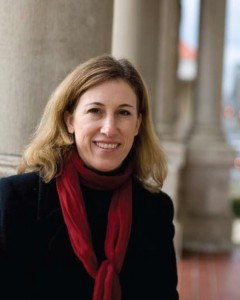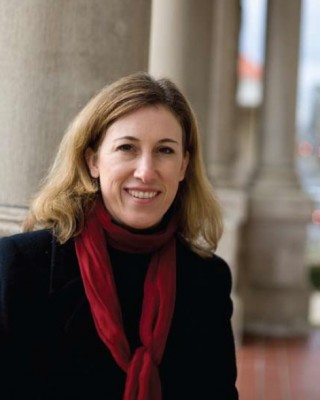
From Queen Noor to Congress
When CJP professor Lisa Schirch launched the 3D Security Initiative in November 2006, she had no way of knowing how long it might take for 3D to gain the attention of top decisionmakers in this country.
Regardless of the months, years or even decades that might be required, Schirch committed herself to advocating for a different approach to national security – one which doesn’t rely on simply one “D” in the “3D toolkit,” the tool of Defense. Real security, Schirch argued, rests on a foundation of two more “D” tools: Diplomacy and Development.
“I felt I owed it to the students I teach, who often come from war zones in foreign countries,” she told Peacebuilder. “They’d say, ‘It is great you’re teaching us about peacebuilding, but what is EMU doing to change U.S. foreign policy?’ I came to feel that I had a duty to work directly at influencing the policies and actions of the United States.”
Surprisingly, Schirch’s campaign on behalf of diplomacy and development garnered attention almost immediately. Six months after 3D Security was launched, Schirch was named “Modern Mother of Peace” by the Ploughshares Foundation, one of seven women in the world to receive this recognition. (One of the others recognized was Susan Granada, MA ’01.)
Major Foundation Honors Schirch
Announcing the honor on the occasion of “Rediscover Mothers Day,” the Ploughshares Foundation noted: “Starting when she was a 20-year-old college student volunteering in a Costa Rican refugee camp for Nicaraguans, Lisa has worked to end conflict and build security, applying her commitment and skills to projects in Lebanon, Taiwan, Ghana and other countries.”
Queen Noor of Jordan, the honorary chair of the “Rediscover Mothers Day” campaign, praised Schirch on CNN for her efforts to use “development projects, like building schools and water wells, to disarm conflicts from Lebanon to Ghana.” Schirch and her husband William Goldberg have two children, a 7-year-old daughter and 3-year-old son.
Schirch directs the program from her base at EMU’s Center for Justice and Peacebuilding in Harrisonburg, Va., while 3D Policy Director Lynn Kunkle is based in Washington D.C. “Some of my students have been a great help in this effort, as have my academic colleagues, whose advice I particularly welcome,” says Schirch. The 3D Security Initiative has collaborated with respected thinktanks to persuade policymakers to work with other countries to solve problems diplomatically. The Initiative also urges leaders to address the economic roots of many conflicts.
In a letter published December 5, 2007, in the Congressional newspaper The Hill, Schirch argued for aid programs to receive more federal dollars, noting that “USAID programs in good governance, economic development, education and healthcare are a humanitarian imperative, but they also create an architecture that grows security from the ground up.”
Growing List of Accomplishments
With funding from the Ploughshares Foundation and Compton Foundation, over the last year, the 3D Security Initiative:
- Issued seven policy briefs on topics ranging from conflict prevention with Iran, to the security implications of climate change. The most recent brief calls for the federal government’s new African initiative to be lodged under the State Department rather then the Defense Department because “Africa’s security challenges share a common denominator – poverty” and thus development solutions rather than military ones will yield the most long-term results.
- Held meetings with 50 lawmakers or their aides on Capitol Hill to recommend improved strategies on Iraq and Iran that would lead to more security.
- Arranged for conflict-prevention experts from Iraq, Iran, Afghanistan, Uganda, Kosovo and other countries to visit Congressional offices to argue for more emphasis on development and diplomacy in U.S. foreign policy.
- Helped design a national survey on public attitudes toward security, which found that “most Americans believe the military should only be used as a last resort,” says Schirch. “There is a broad consensus that first we should use nonviolent ways of engaging the world through economic development and robust diplomacy.”
- Hosted or co-hosted several meetings of coalitions and advocacy groups that have complementary ideas on ways to address global conflicts; the meetings were designed to foster partnership in approaching policy- and decision-makers, making alternative solutions more likely to be heard, appreciated and acted upon.
- Conferred with military leaders at the National Defense University, the Army War College and the Joint Forces Command on practical, effective alternatives to military force in conflict zones.
- Accepted an invitation to participate in developing conflict analysis tools and peacebuilding frameworks with Department of Defense and State Department analysts and policy-shapers.
- Received broadcast coverage on more than 20 radio and TV outlets, including an appearance by Schirch on Heartland with John Kasich, aired nationally by Fox.
- Gave 16 public presentations before nearly 3,000 people.
- Launched the website www.3Dsecurity.org, which carries more details on all of the above.
Sidebar: 8 Steps Toward Peace with Iran
Signs of New Tide
The tide is beginning to turn. Defense Secretary Robert M. Gates is now calling for a dramatic increase in U.S. foreign aid. Opinion-writers Richard L. Armitage and Joseph S. Nye Jr. called for “smart security” and “smart power” in a December 9, 2007 article in The Washington Post. The United States should become “a smarter power by once again investing in the global good, by providing things that people and governments want but cannot attain without U.S. leadership,” they wrote. “By complementing U.S. military and economic strength with greater investments in soft power, Washington can build the framework to tackle tough global challenges.”
In support of the calls for new approaches to foreign policy, the 3D Security Initiative brings the experiences and wisdom of people working at the frontlines of peacebuilding around the world to our nation’s leaders.
“When I took three persons working in Iraq and one Afghani to Congressional offices last summer, U.S. officials were very interested in hearing about what worked – and didn’t work – on the ground in conflict zones,” said Schirch. “It is very unusual for Congressional officials to meet someone like Hero Anwar, a courageous woman who works for an Iraqi community development organization. She knew first-hand what it takes to prevent violence and build security, which gave her great credibility.”
[Note: In 2011, the 3D Security Initiative became 3P Human Security.]
